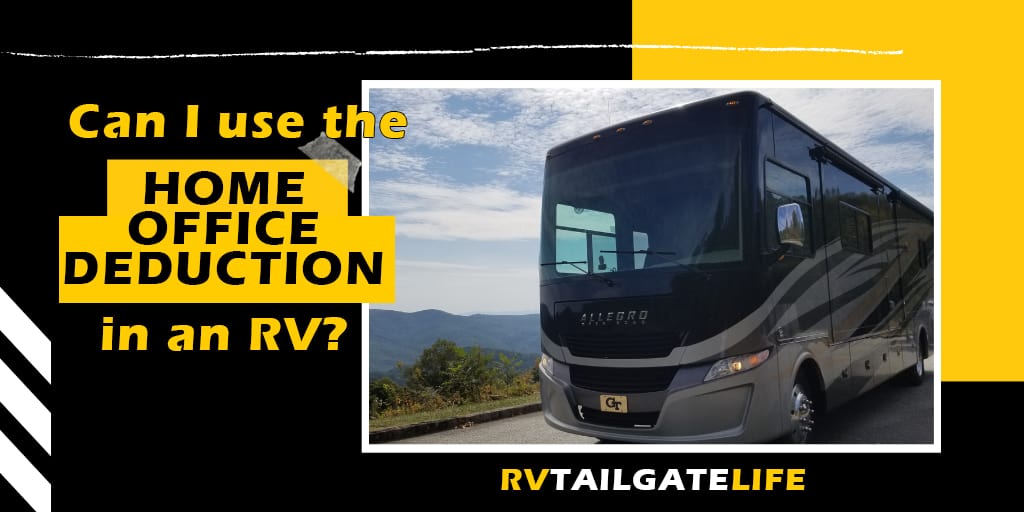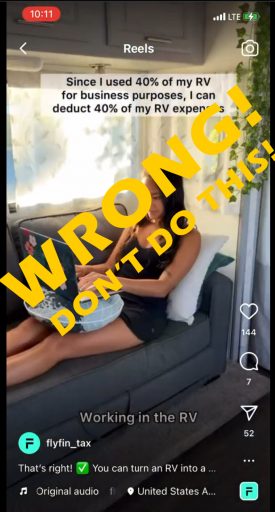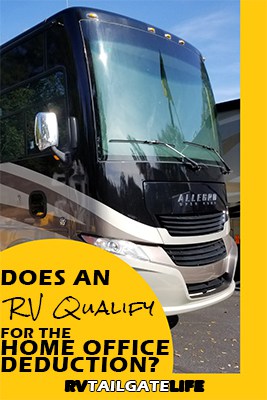Can You Take a Home Office Deduction in your RV?
Do you have a business and an RV? Work from the road?
Then you might be tempted to take a home office deduction for a portion of your RV on your taxes.
But this is a bad idea. Let’s explore why, despite what at least one “influencer” is promoting on social media.

First, let’s get a little legal stuff out of the way: RV Tailgate Life does not provide tax, legal or accounting advice. This material has been prepared for informational purposes only, and is not intended to provide, and should not be relied on for, tax, legal or accounting advice. You should consult your own tax, legal and accounting advisors.
RVs and Taxes
Many of you know that when I’m not writing about RVs and sports, I spend my time as an attorney. I’ve even got lots of knowledge (hi Masters in Tax) and experience in tax and accounting. So when it comes time to talk RVs + taxes, I know my stuff.
It’s why I’ll drop in every once in awhile with articles like these:
- How to Maximize RV Tax Deductions
- Fact or Fiction: Registering RV in a Montana LLC to Avoid Sales Tax
Now it is time to talk specifically about RVs and the Home Office Deduction.
What is the Home Office Deduction?
Under the home office deduction, you can write-off a portion of your rent or mortgage expenses, including utilities, on your taxes.
But of course, you have to qualify for the deduction.
Qualifying for the Home Office Deduction
There are a couple of different ways to qualify for the home office deduction in a standard sticks and bricks home (or condo, apartment, townhouse, etc. This can also be a separate structure on your property).
To qualify, your home office must be “exclusive and regular use” for business purposes and then be either the principal place of business or where you regularly meet clients or customers.
So your kitchen table does not count. But a room that you use only for your office space and not a guest bedroom would count.
It doesn’t even have to be a separate room; it can be a portion of an area – a nook or corner area. The idea is that the only purpose of this area is for work and that you use it regularly.
Since we are talking mostly about self-employed digital nomads or professionals that can work on the road, we’ll assume that this home office can qualify as the “principal place of business.”
You Must be Self-Employed
Before 2018, pretty much everyone that worked from home could take a home office deduction. However, that changed with the 2018 Tax Cuts and Jobs Act (TCJA).
Since the 2018 Tax Cut, only business owners or self-employed individuals can take the home office deduction. If you are an employee, your home office expenses are not deductible.
If you file a Schedule C for any kind of business – self-employment, gig jobs, or freelance work – you will likely be able to take a home office deduction. If you otherwise qualify (exclusive and regular use of a portion of your home).
RVs Can Be Your Home
The tax code, in several different places, says that RVs can qualify as homes. For example, for the home mortgage interest deduction that I discussed in-depth in an earlier post.
For purposes of the home office deduction, the term “home” is defined pretty broadly and would include your RV.
But You Likely Won’t Qualify for the Home Office Deduction
Even though your RV can be considered your home, you likely won’t be able to qualify for the home office deduction, even if you are self-employed.
Because of the regular and exclusive use of the area as your home office.
Very few RVs are big enough to have dedicated spaces. Most RVers end up using the kitchen table as their office.
Some people may have converted a bunk area into an office, which would make it more likely to qualify. But if that space is also used as a closet, it wouldn’t be exclusive use.
If you think you have an area that could qualify, make sure that you document it well. Take pictures and videos – do a video tour of your RV that shows the entire thing and where you spend most of your time (ie show that you have separate sleeping, eating, and leisure spaces). Then show the office where you have your office computer, screens, and any other equipment setup.
These Social Media Influencers Say Otherwise

Recently, and what really prompted this article, is that I came across a post by this social media influencer on Instagram. They claim to be a tax preparation service that is powered by AI.
So you probably already know where this is going. In fact, they were so wrong that I’m not even going to link to them.
In their video – and repeatedly in the comments – they say that you can use the home office deduction in your RV. For sitting at the kitchen table or the living room sofa to work. That it doesn’t matter if you use the area exclusively for business purposes or not.
They say that you can use the percentage of time you use your RV for business purposes to claim this deduction.
Like much of the social media tax and law guidance out there, it is wrong. You cannot use a percentage test of how much you use your RV for business vs personal use to calculate the home office deduction.
Now, there may be some other expenses that you can use a percentage test – like say your internet connection. But not for the home office deduction.
AI gone wrong. Again. (Hey, not bashing all uses of AI, but it is also really good at making stuff up. So beware as you see videos like this one spouting all the wrong info.)
What the IRS Says
It’s not just me that says that you are unlikely to qualify an RV as a home office. The IRS has consistently held this position and courts have backed them up.
In Dunford v. Commissioner, 2013 tax court case where the taxpayer lost because the area used as a home office was the dinette area. Court found that it was “implausible to suggest that, in the cramped quarters of a motor home, an unclosed area like the countertop would somehow be exclusively reserved to business activity.” Many other business related expenses associated with their RV travels were also disallowed.
The taxpayer then had to pay not only the taxes, but penalties and interest on top of it. Ouch!
There are many more audits that have also held the same.
Even if You Can… Should You?
We know that you have to use an area of your home (or RV) exclusively and regularly for business purposes in order to qualify for the home office deduction.
Let’s assume for a minute that you do have a space that qualifies for this – say you converted a bunk room into an office space that you don’t use for storage, sleeping, eating, or leisure (no watching movies on those screens or playing video games).
How many square feet is that?
My Tiffin 34PA is approximately 355 square feet in total. In the 36UA model, the bunk bed area is 28″ x 70″ – about 13.6 square feet – with a similar total square footage of 355 square feet. Yes, this is with all the slides out.
Under the simplified methodology, you get $5 per square foot, up to 300 square feet. That’s worth about $68 in a deduction. Is that worth the audit risk?
Under the actual expenses methodology you would use the percentage of your expenses for the deduction. For a Tiffin 36UA using the entire bunk space as the office, that’s 3.83%.
Now you have to figure out the expenses that qualify and make sure you document them. Utilities and interest, insurance, repairs, security, and so on. Yes, you have to have good quality records.
Your deduction would be 3.83% of the allowable expenses. But don’t double count the interest if you are also taking it on the home mortgage interest deduction. Don’t double count things like cellphones or internet access or gas that you deduct directly as a business expense.
What do I do?
I am a part-time RVer – I have a traditional sticks and bricks house and then use my RV on a part-time basis.
My house has an area that qualifies for the home office deduction – a dedicated office space that is only used for that purpose and is also the principal place of business for my company (both RV Tailgate Life and my law practice). So I take the home office deduction for my house.
However, my RV does not have a space that I can qualify for a home office – when I work from the road, it is at the kitchen table (or a co-working space or client location). This means that I cannot take an RV home office deduction.
I am able to take the home interest mortgage deduction on the RV. And when I use it for business travel, I can take the expenses associated with the business travel.
Most RVers Don’t Qualify for an RV Home Office Deduction

The bottom line is that most RVers are not going to qualify to use the home office deduction in their RVs.
Most self-employed individuals that work in their RVs are not going to have a space that qualifies under the “regular and exclusive use” test.
Even if you do qualify, it probably won’t be worth the small savings to justify the documentation required and the increased risk from penalties and interest if it is disallowed by the IRS.
So let’s continue to enjoy the RV lifestyle and find other ways to save some money.
Like these RV tips? Pin for later!
You may also like:
How to Save Gas while RVing
RV Insurance Explained Before You Shop
RV Security System by Ring Alarm Pro
